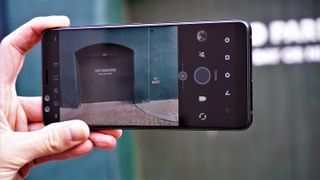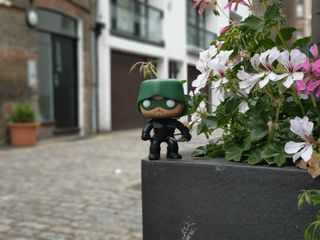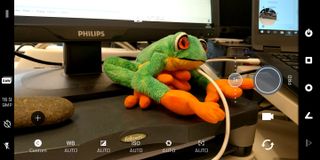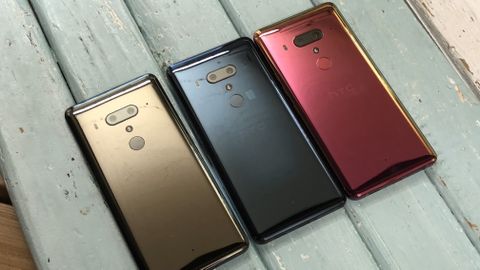Why you can trust TechRadar
- Camera has some excellent capabilities in many scenarios
- Can't quite cut it with the best, despite a great DxOMark score
- Low light is where it really excels
The camera on the HTC U12 Plus comes with high praise from DxOMark, using similar HDR boosting techniques to those found on the Pixel 2 range, which has arguably the best camera on the market.
There’s the dual 12MP sensor on the rear, offering both electronic and optical image stabilisation. There’s a ‘standard’ sensor on there, and a telephoto lens in a set up that’s very similar to the iPhone X.

In practice though, the U12 Plus doesn’t always give results that put it in the same bracket as the Pixel 2. Where it does excel is in low light shooting, as it’ll thrash the iPhone or Pixel 2 at creating more natural colors and capturing extra elements in the gloom.
The image processing generally does a good job of clearing up noise in the darker scenes, leading to clearer snaps even though the exposure has been boosted to show more of the image.
In daylight too, the images are pretty good - certainly clear and crisp. The sharpness is good, but the colors often err on the side of too saturated - this is especially true when in slightly darker scenes, where there’s a touch of gloom around.
While there’s a modicum of automatic scene recognition, we never got a snap that made us step back and marvel at the wonder of it, which has happened on other phones (like the Galaxy S8 or the Pixel 2, for instance).
Bokeh mode is a little patchy. Outdoors, in great light with a good slug of distance from the subject, you can get some great results, as seen here:

However, take it indoors and in darker scenes the U12 Plus can struggle a little - hard to say why when you'd expect some aperture compensation, but the processing certainly cleans things up after the shot.

It seems that the U12 Plus can also recognise food too, punching up the colors of the snap a bit when needed. It can make things seem a little over-saturated, but apparently that's the best way to take a food photo.

There’s nothing wrong with the images, but like so much of this phone they’re a mix of impressive snaps and some that fail to inspire much awe. The low light will impress you, and it’s clear HTC has worked on this, but overall you’ll sometimes be left feeling a little flat with what you’ve captured, although you’ll rarely get a bad snap.
That said, the camera software on the HTC U12 Plus is where it really falls down. It’s just so slow.

Opening the camera can sometimes take a second or two, and pressing the shutter button doesn’t fire instantly when the HDR mode is on (which you’ll really want). This might not sound like a lot described here, but in practice it’s really terrible.
Like other Android phones, there are a lot of buttons on show here, and it’ll take a while to figure out where they all are. The bokeh mode is tough to work out too, with a tap leading to a pause as the camera app adds in the capability. Tapping it again adds in manual mode (so you can adjust the blur) and once more turns it off.
It’s not terrible, but it doesn’t feel terribly intuitive. There are loads of camera modes to choose from, from hyperlapse to slow motion to pro mode, with the latter coming with loads of different parameters to play with.
In this mode you can also shoot in RAW, which will please those who like to manipulate your snaps with all the information retained. There’s no RAW processing on the phone any more, which is a shame as it boosted the photos quite well, but image enhancements through Google Photos (the default gallery app here) do a pretty good job of improving things.
The selfie camera has also been upgraded on the HTC U12 Plus, with two 8MP sensors on the front offering both a wider image and the ability to take selfies with a blurred background.
The former works pretty well, making it easier to get more people into the shot, and the latter performs just fine as well - not as blurred as we’d like, but it gets the job done.
Where it does fall down is image quality a little - skin tone in particular doesn’t look very natural, and the damn Beauty Mode is set on by default, making your skin look overly smoothed and cartoony. Yes, you can turn it off, but it adds a small ethereal glow to things.
Some people might really like this, but beauty mode feels like something that should be an effort to turn on, because the results often don’t look great.
Perhaps you’ve come away from reading this section thinking that the camera on the HTC U12 Plus is poor. It’s not, by any stretch of the imagination. It’s just a little rough around the edges and doesn’t delight in the way some of its peers do - and the camera software is too slow for our tastes.
In terms of capability and customization though, as well as low-light performance, the HTC U12 Plus excels and we doubt you’ll ever get a truly bad picture from it.
Sonic Zoom, the video recording feature that allows you to zoom into the action and focus on only the audio of the subject, works pretty well indeed, and you can get some really nice video using this with 4K shooting at 60 frames per second.
There's a smoother zoom as well - so when you zoom in it won't jump straight away, so you can get a more impressive cinematic event from your phone. We'd argue that the HTC range has been one of the best devices for video recording for years, and the U12 Plus has done nothing to diminish that reputation.












Gareth has been part of the consumer technology world in a career spanning three decades. He started life as a staff writer on the fledgling TechRadar, and has grown with the site (primarily as phones, tablets and wearables editor) until becoming Global Editor in Chief in 2018. Gareth has written over 4,000 articles for TechRadar, has contributed expert insight to a number of other publications, chaired panels on zeitgeist technologies, presented at the Gadget Show Live as well as representing the brand on TV and radio for multiple channels including Sky, BBC, ITV and Al-Jazeera. Passionate about fitness, he can bore anyone rigid about stress management, sleep tracking, heart rate variance as well as bemoaning something about the latest iPhone, Galaxy or OLED TV.
